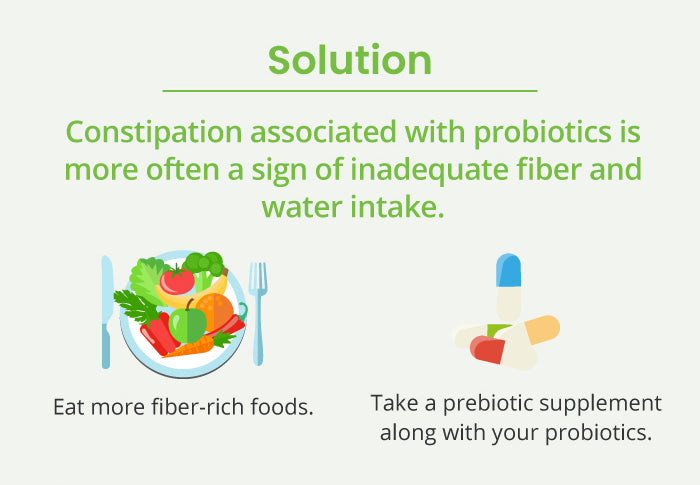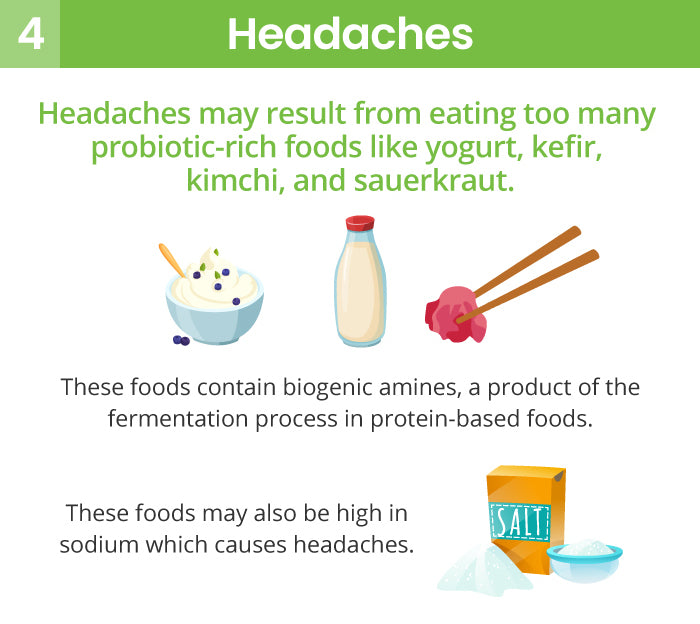
Probiotic supplements are one of the best ways to replenish good gut bacteria and support a balanced microbiome. This can contribute to a variety of positive health effects, including improved digestion, optimized immune function, and less inflammation caused by bad bacteria.
However, for some people, probiotics require an adjustment period, during which they may experience some mild side effects. This can be discouraging, but before you stop taking your probiotics, read on to learn more about some of the common side effects of probiotics and how you can reduce or prevent them.
Read next: The Best Time to Take Probiotics to Avoid Side Effects

Probiotics Side Effects & How to Prevent Them
1. Probiotics Can Cause Gas
The most common negative side effect of probiotics is mild gas and bloating. This usually happens when you first begin taking probiotics but usually gets better with use.
What causes gas and bloating? Gas and bloating means that your digestive system is not breaking down and absorbing your food completely. The undigested food gets passed into the gut where probiotics and other gut microbes ferment the undigested food and produce gas.
The feeling of bloating is usually because your body is not used to the increased probiotic activity. Taking a probiotic can increase the number of probiotics inside your gut. This increased microbial activity produces additional gas which your body is not used to.
After the initial period (within the first few days of taking probiotics), your body should gradually adapt to the new friendly bacteria, allowing for improved digestion.

If your gas and bloating do not get better while taking probiotics there are two things you can do:
1. Try taking a digestive enzymes supplement along with your probiotics to help your body break down, digest, and absorb food. More complete digestion helps reduce gas and bloating.
2. Try taking the probiotics on an empty stomach before bed. Probiotics can produce gas when provided with certain kinds of foods and taking probiotics before bed minimizes the chance of that happening.
If you've tried switching to taking probiotics on an empty stomach before bed for longer than 2 weeks but are still getting gas and bloating, then the combination of probiotics that you're taking may not be right for you.
2. Probiotics Can Cause Constipation by Revealing Underlying Digestive Issues
Probiotics typically reduce constipation. According to several studies, probiotics were found to increase the average number of weekly bowel movements by 1.3, and generally supported softer stools that were easier to pass. These studies found Bifidobacterium to be the most effective probiotic for supporting regular digestive health.5

Because constipation is not typical when taking probiotics, experiencing constipation with probiotics may be a sign that you do not have enough fiber or water in your diet. In these instances we recommend increasing consumption of fiber with your probiotics. You can also start taking prebiotic fiber with your probiotics. Be sure to select one that is organic and diverse so your probiotics can have good food to thrive.
3. Probiotics Can Cause Diarrhea
Studies have shown how helpful probiotics can be for infectious diarrhea, traveler's diarrhea, antibiotic-associated diarrhea, and C diff diarrhea. However, they can cause diarrhea in some people.

This negative side effect should pass as your body gets fully adjusted to the new probiotics. In the long run, probiotics should not cause diarrhea. If you have diarrhea that lasts greater than 2 weeks while taking a probiotic then stop taking probiotics.
4. Probiotic-rich Foods Can Cause Headaches
Headaches may be experienced when consuming probiotic-rich foods such as yogurt, kimchi, and sauerkraut. These foods may contain biogenic amines, which are substances that naturally form in any protein-based foods as they age or ferment.3

Common amines found in probiotic-rich foods include histamine, tyramine, and tryptamine.4 Studies suggest that some people may be sensitive to amines, which can stimulate the central nervous system and cause headaches.5
Fermented foods may have a lot of seasoning that causes dehydration and headaches. For example, kimchi can be high in sodium which contributes to headaches.
Most probiotic supplements should not have any headache-causing biogenic amines or salt.
5. Probiotics Can Cause Allergic Reactions
Another possible side effect of taking probiotics is an allergic reaction. Humans can be allergic to just about anything, including milk which is often used in the probiotic production process.

The purification process used in the production of some probiotics such as Nexabiotic® Advanced should remove most of these allergens.
If you are lactose intolerant you should be able to tolerate the small amounts of milk in probiotics. Furthermore, probiotics themselves break down lactose. This is the reason why probiotic-loaded kefir yogurt is advertised as being lactose-free.
However, if you have developed an allergic reaction to milk ingredients that results in problems breathing then you should avoid probiotics.
Can you Overdose on Probiotics?
Probiotic-rich foods and supplements are generally considered safe. Your body is already filled with trillions of diverse bacteria, so overdosing is rare assuming that your immune system is healthy and functioning as normal.8
That said, you can always have too much of a good thing. Taking too many probiotics can create an unstable intestinal environment, which may result in many of the gastrointestinal side effects mentioned above, including diarrhea, abdominal pain, gas, bloating, and nausea.12

If you accidentally overdose on probiotics you should not be concerned as your gut microbiome will quickly reach a new equilibrium after you stop taking probiotics. An effective probiotic dose is 10 billion CFUs. Stick to a daily dose around 10 billion CFUs and only increase if needed such as when you’re taking a course of antibiotics or have an underlying digestive issue.
Who Shouldn't Take Probiotics?
People with Compromised Immune Systems
Although probiotics benefit the immune system, they can potentially pose a danger to people in the following circumstance:
1. If a person has a compromised immune systems
2. AND they have an open IV or central line
3. AND they are being administered probiotics in powder form.
According to one review article, persons who have the highest risk when taking probiotics are immunosuppressed or are premature infants. Immunocompromised people also include those with untreated HIV, people with weakened immune systems (cancer patients, patients who have had recent bowel surgery, or those that are taking immunosuppressant drugs such as corticosteroids.)7
Minor risks include having a central venous catheter, having an impaired intestinal barrier, cardiac valvular disease, and those simultaneously taking a broad spectrum antibiotic to which the probiotic is resistant, and taking probiotics via a jejestomy tube.
The authors of the review article recommended that probiotics be used with caution if there is one major risk and one minor risk.13
If you have a weakened immune system you should consult your physician before taking a probiotic supplement.

How to Avoid or Reduce Probiotic Side Effects
Most probiotic side effects are mild and should go away on their own as your body gets used to the replenished gut bacteria. However, you can take some simple steps to ease the adjustment and reduce the severity of any side effects.
1. Drink Plenty of Water
Staying hydrated is always a good idea, but even more so if you are grappling with any side effects from probiotics, particularly constipation. Dehydration, even in its mildest forms, is one of main causes of constipation. Drinking plenty of water throughout the day can help to soften stools and stimulate bowel movements.
If you are experiencing diarrhea as a side effect, you are even more susceptible to dehydration. Drinking water will replenish your fluids and prevent more severe issues related to dehydration, including fatigue, dizziness, and confusion.
2. Take Probiotics Before Bedtime
Taking probiotics immediately before bedtime on an empty stomach may help to reduce gas and bloating. Your gut is relatively inactive at night, but probiotics can produce gas when combined with certain foods. Taking food on an empty stomach ensures that the probiotics don’t have any obstacles in the way, which also allows more of the live bacteria to reach your large intestines.14
3. Take Prebiotic Fiber
While probiotics replenish your gut bacteria populations, prebiotics feed existing gut bacteria, allowing them to multiply and grow on their own. Most prebiotics are composed of fiber, which is composed of plant material that cannot be absorbed or digested. Being undigestible is important as it ensures that the dietary fiber can reach the large intestines relatively intact to feed the bacteria there.
Dietary fiber has been studied for its wide range of health benefits, including its potential to reduce cholesterol, regulate blood sugar levels, and support a healthy heart. Dietary fiber is also essential for normalizing bowel movements. Fiber increases the size and weight of stools, allowing for a stool that is easier to pass. Dietary fiber may also help stools absorb more water and increase bulk, creating a more solid stool. This makes fiber an essential component for both constipation and diarrhea, as well as bowel health in general.
If you are experiencing constipation or diarrhea from probiotics, consider taking your probiotics with a prebiotic supplement, like DrFormulas® Organic Prebiotic Superfood.
4. Take Digestive Enzymes
Digestive enzymes break down food particles for optimal digestion and absorption. One of the main causes of gas and bloating is undigested or unabsorbed food reaching the gut bacteria. The gut bacteria feed on the partially digested food particles, releasing gas and causing bloating.
Certain foods are rich in digestive enzymes, including:
- Papayas, which contain papain, an enzyme that breaks down proteins
- Pineapple, which contains bromelain, another enzyme that breaks down protein
- Oats contain an enzyme called lipase that can help to break down fats
- Whole grains contain amylases that can help to break down starches and glycogens into more simple sugars
However, foods tend to contain fewer amounts of digestive enzymes than pills or supplements. Consider taking your probiotics with digestive enzyme supplements to reduce gas and bloating.
Taking probiotics can benefit nearly every aspect of your personal health and wellbeing. Most prominently, probiotics can support digestive health to reduce common gastrointestinal issues, including diarrhea, constipation, and excess gas and bloating.
Probiotics may also support general immune function and reduce inflammation. This reduced inflammation in the gut may also manifest as a reduction in stress and improvement in mood via the gut-brain axis. Reduced inflammation in the gut will mean reduced inflammation in the blood, brain, and on the skin.
Choosing the right probiotic supplement is the key to getting the best results. The three main things to look for include:
- Diverse strains – A diverse microbiome allows your gut to handle a larger and more variegated array of stressors. Look for probiotics that contain as many different types of probiotic strains as possible.
- Dosage – Probiotics are measured in colony forming units (CFUs), which generally measures the amount of active bacterial strains in the supplement. While exact numbers can vary on your personal needs, most experts recommend taking at least 10 billion CFUs. However, if you are experiencing harsh side effects, start low before you work your way up to 10 billion CFUs.
- Delivery system – Most bacteria are unable to survive the harsh stomach acids and digestive enzymes in the stomach. Find a supplement that uses a protective, time-released coating that allows the probiotics to survive the stomach acids and reach the gut for proper colonization.
Although probiotics can come with some minor side effects, don’t get immediately discouraged. The potential benefits of probiotics can far outweigh the temporary side effects, and with some of the above steps, you can easily mitigate the side effects and support your comfort. If you are looking for an easy and convenient supplement to start, try DrFormulas® Nexabiotic® probiotic supplement. Consult your doctor if you experience side effects that last longer than a few weeks.
Read next: The Best Time to Take Probiotics to Avoid Side Effects


Share this Image On Your Site
Sources:
- https://nccih.nih.gov/health/probiotics/introduction.htm
- https://medlineplus.gov/ency/article/003883.htm
- https://www.ncbi.nlm.nih.gov/pubmed/10421978
- https://www.healthline.com/nutrition/probiotics-side-effects
- https://www.health.harvard.edu/blog/probiotics-may-ease-constipation-201408217377
- http://www.berkeleywellness.com/supplements/other-supplements/article/probiotics-pros-and-cons
- http://www.aafp.org/afp/2008/1101/p1073.html
- https://www.health.com/digestive-health/can-you-overdose-on-probiotics
- https://www.biology-online.org/dictionary/Colony-forming_unit
- https://www.consumerlab.com/answers/how-many-cells-or-cfus-should-my-probiotic-have/probiotic-cells-CFU/
- https://www.probioticsguide.com/is-a-higher-cfu-count-better-in-probiotic-supplements/
- https://www.shape.com/healthy-eating/diet-tips/can-you-od-probiotics-experts-weigh-how-much-too-much
- https://academic.oup.com/ajcn/article/83/6/1256/4632996
- https://www.womenshealthmag.com/health/a29776739/when-to-take-probiotics/









